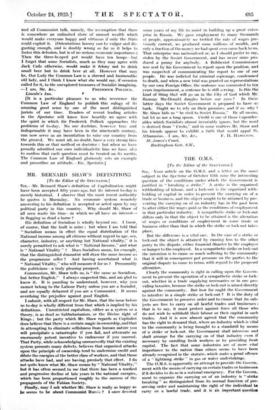MR. BERNARD SHAW'S DEFINITIONS [To the Editor of the SPECTATOR.]
Sia,—Mr. Bernard Shaw's definition of Capitalization might have been accepted fifty years ago, but its interest to-day is merely historical. I observe that the most recent authority he quotes is Macaulay. No economic system remotely answering to his definition is accepted or acted upon by any political party in this country. Why should Mr. Shaw of all men waste his time—in which we all have an interest— in flogging so dead a horse ?
His definition of Socialism is wholly beyond me. I know, of course, that the fault is mine ; but when I am told that " Socialism means in effect the equal distribution of the National income among all citizens without regard to age, sex, character, industry, or anything but National vitality," it is surely permitted to ask what is National Income," and what is " National Vitality ? Does Socialism mean, for example, that the distinguished dramatist will draw the same income as the programme seller ? And having ascertained what is " National Vitality," who will measure it for us ? Presumably the politicians—a truly pleasing prospect.
Communism, Mr. Shaw tells us, is " the same as Socialism, but better English." I always suspected this, and am glad to know it. It is puzzling to understand, however, why you cannot belong to the Labour Party unless you are a Socialist, and are equally debarred if you are a Communist. It seems overdoing the prejudice against good English.
I submit, with all respect for Mr. Shaw, that the issue before us to-day is wholly different from that which is implied by his definitions. Unrestricted capitalism, either as a system or a theory, is as dead as Sabbatarianisrn, or the Divine right of Kings ; but the party which Mr. Shaw regards as Capitalist does believe that there is a certain magic in ownership,and that in attempting to eliminate selfishness from human nature you will precipitate a catastrophe if you fail, and attenuate an enormously potent incentive to endeavour if you succeed. That Party, while acknowledging unreservedly that the existing system presents many defects, believes that organized attacks upon the principle of ownership tend to undermine credit and dilute the energies of the better class of workers, and that those attacks have had, and are having, precisely that effect. I do not quite know what Mr. Shaw means by " National Vitality," but it has often seemed_ to me that there has been a marked and progressive decline of late years in the national energies, which has been proportioned roughly to the success of the propaganda of the Fabian Society.
Finally, may I ask whether Mr. Shaw is really as happy as
he seems to be about Communist ? I once devoted some years of my life to assist in building up a great enter- prise in Russia. We gave employment to many thousands of people, approximately we trebled the rate of wages pre- viously current, we produced some millions of wealth, and only a fraction of the money we had spent ever came back to us. That enterprise was nationalized or, as I should prefer to say, stolen by the Soviet Government, and has never since pro- duced a penny for anybody. A Bolshevist Commissioner was sent by his Government to report upon the position, and was suspected of communicating the report to one of our people. He was indicted for criminal espionage, condemned to death, and when a new trial was granted on representations by our own Foreign Office, the sentence was commuted to ten years imprisonment, a sentence he is still serving. Is this the kind of thing that will go on in the City of God which Mr. Ramsay MacDonald dangles before our eyes ? In these latter days the Soviet Government is prepared to have ua back. Ought we to rely on their promises, and if so, why ? Mr. Shaw bids us " be civil to Soviet Russia." By all means, but let us use a long spoon. Credit is one of those imponder- ables which Socialists almost invariably ignore, but the word is derived from " Credo,- and in some matters Mr. Shaw and his friends appear to exhibit a faith that would appal St.
Buckingham Gate, S.W.






























































 Previous page
Previous page